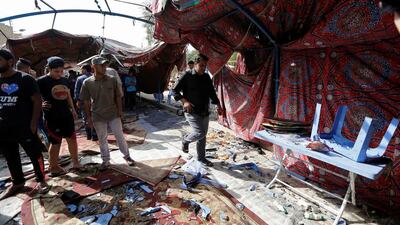Baghdad // A suicide bombing claimed by ISIL killed at least 34 people in Baghdad on Saturday, as militant attacks elsewhere killed another 12 people.
The bombing, which also injured at least 36 people, was the deadliest single attack to hit the Iraqi capital in over three months and came as Iraqi forces prepare for an operation to retake Mosul, the last ISIL-held city in the country.
ISIL issued an online statement claiming the attack, which targeted a funeral tent where mourners were gathered to pay their respects in the Shiite-majority Shaab area of north Baghdad.
A witness said the bomber entered the tent and blew himself up as lunch was being served.
“I saw with my eyes 20 martyrs on the ground,” the witness said.
Blood stained the ground at the scene of the attack, which was littered with the remains of plastics chairs mourners had been seated on.
ISIL, a Sunni extremist group, considers Shiites to be heretics, and frequently carries out suicide bombings and other attacks against them in Baghdad and elsewhere in the country.
Also on Saturday, militants attacked two areas north of Baghdad, killing a further 12 people, according to police.
In Malha, an area east of the city of Tikrit, suicide bombers attacked a federal police position, killing eight and wounding 11, officers said.
And in the Ishaqi area, two militants shot dead the wife and three children of the commander of local tribal forces before fleeing and blowing themselves up when they were cornered by Iraqi forces.
There was no immediate claim of responsibility for the attacks.
Saturday’s bombing was the deadliest to hit the Iraqi capital since early July, when a suicide bombing in central Baghdad sparked infernos in a crowded shopping area, killing more than 300 people.
That attack led to a shake-up of senior Baghdad security officials and the announcement of other measures aimed at improving security in the capital, but the bombings have continued.
One ISIL-claimed bombing in Baghdad on October 9 killed at least five people, while two more earlier in the month left at least 10 dead, and two others killed at least 17 people at the end of September.
ISIL stepped up attacks on the capital as Iraqi forces retook much of the territory it seized in 2014 and 2015.
The launch of the operation to liberate Mosul is expected to be announced soon, but it will mark only the start of a battle that is expected to be the most difficult and complex yet in the war against ISIL.
A coalition of disparate and sometimes rival Iraqi forces, including government troops, Shiite militias, Sunni militias and Kurdish fighters, will have to fight their way through ISIL defences to reach the city.
Then they will likely seek to surround the city before launching an assault, marking the start of deadly street fighting with diehard extremists in a city with a large civilian population.
The president of Iraq’s autonomous Kurdish region said on Saturday that preparations for the operation were complete.
“The time has come to begin the liberation of Mosul,” Massoud Barzani said. “All preparations for the battle to liberate Mosul have been completed.”
Iraqi Kurdish Forces are expected to play a major role in the fighting.
The battle for Mosul may spark a humanitarian crisis, with the United Nations warning that up to one million people could be displaced by the fighting as winter sets in.
Even the recapture of Mosul will not mark the end of the war against ISIL, which still holds other territory in Iraq and is likely to turn increasingly to insurgent tactics such as bombings and hit-and-run attacks as it loses more ground.
* Agence France-Presse

